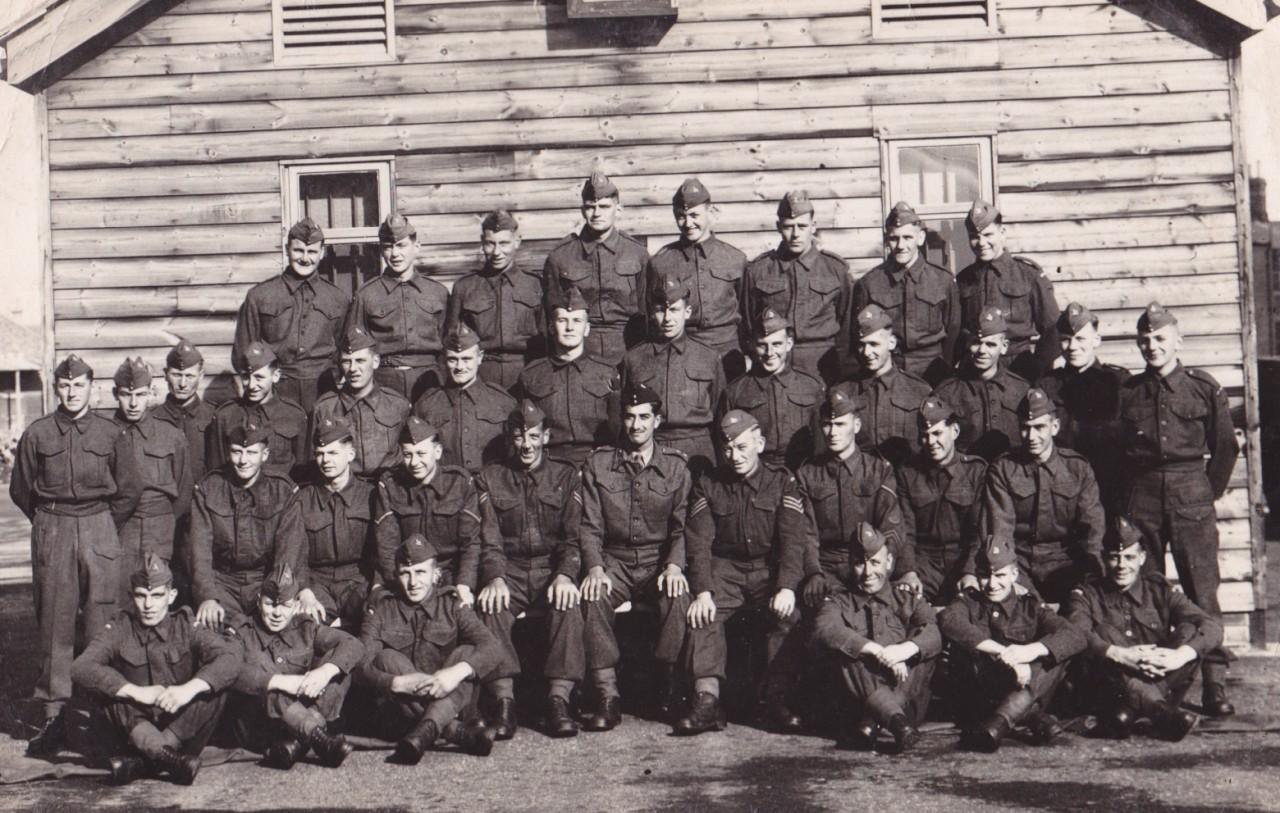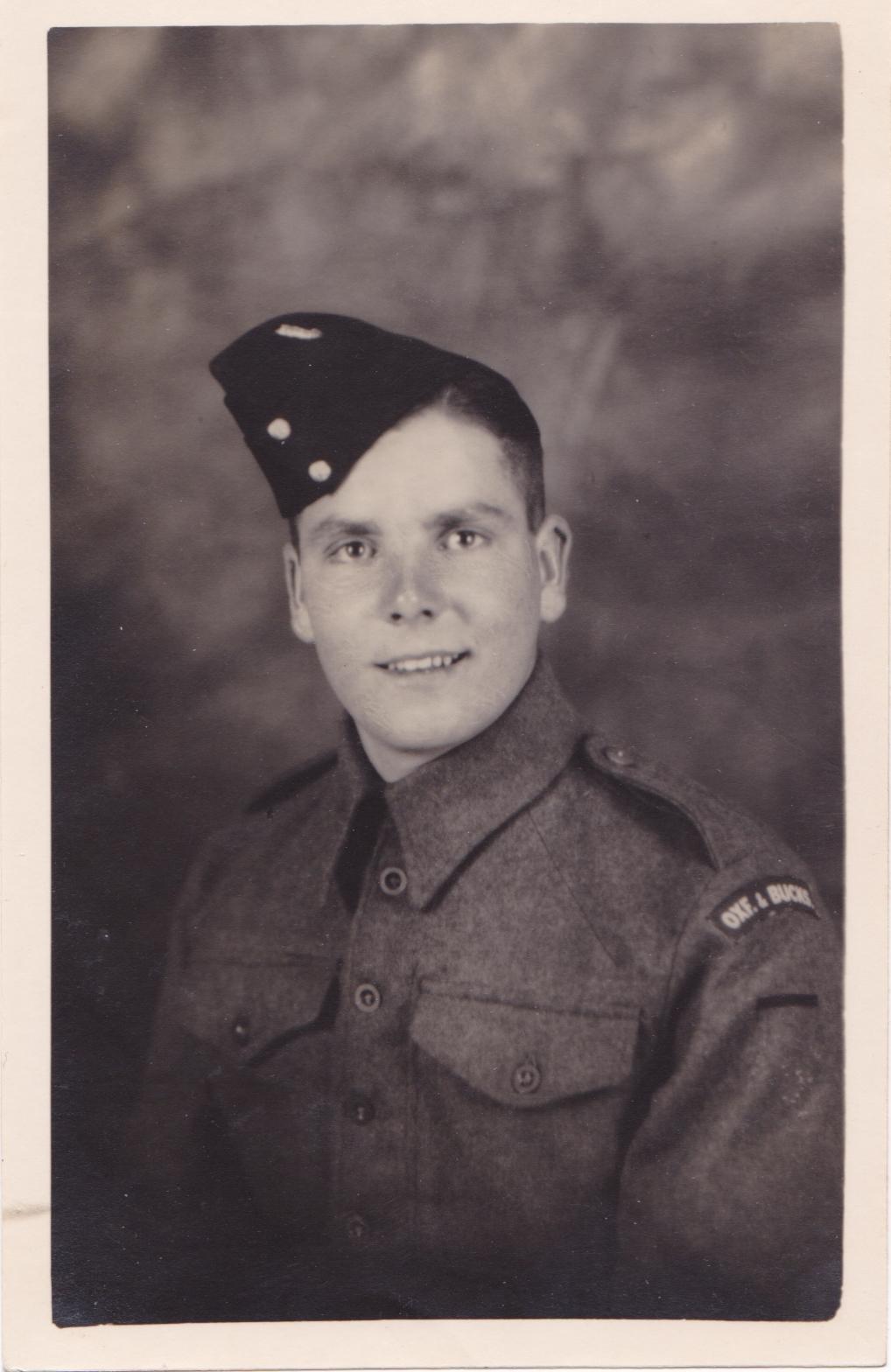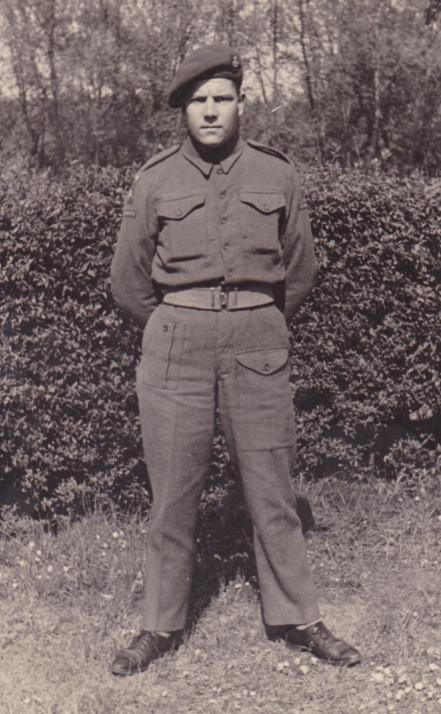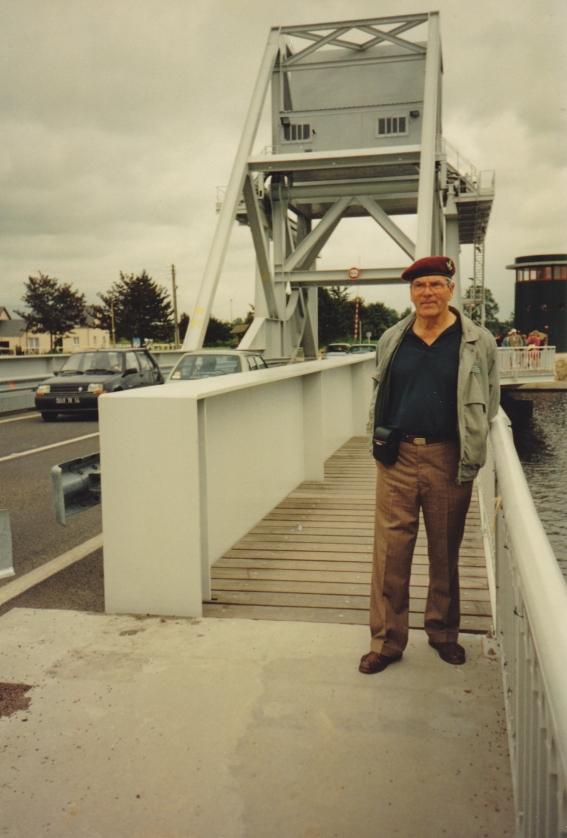Reminisces of Pte Harold Lewellyn Badcock (14646712) - Ox & Bucks, 6th Airbourne
Note: Written in 2010 and submitted to the Imperial War Museum Documents Archive in September 2010. Harold passed away in 2012
I was born, one of a family of eighteen in a quiet country village in Cambridgeshire and my early years were spent there. My Father was a farmer, and even as children, apart from school, was spent working on the farm. At fourteen I left school and continued helping my Father by tending the animals and growing crops etc. In those days any chance of further education or following a chosen career were very remote.
It was wartime, food and petrol were rationed, travel very limited and no one ventured far afield. Life was mainly hard work, little pay, with very little time for sport or socialising.
Being called up and training
In July 1943, when I was eighteen I received my calling-up papers to join H.M. Forces. I had no choice, even though farm work was usually considered exempt from National Service. No other member of my family had needed to go prior to that time.
Two weeks later found me joining three other school friends at the bus stop in the village, on our way to Bury St Edmunds for a six-week initial Army training course. This was followed by further training at Colchester, which proved to be extremely intensive, strict and severe. One recalls incidents from my ten weeks there...
- a quick march from our billet to the cookhouse for each meal, carrying our cutlery, mug and plates.
- the ruling that everything on one's plate must be eaten up, otherwise a visit to the C.O. would ensue with a charge of wasting food.
- The Regimental Sergeant Major's frequent visits to our hut which housed thirty men, for inspection of equipment, clothing, beds etc. Any even small defect resulted in a visit to the C.O. for punishment. This might be six to ten days confined to barracks, with regular reporting to the Orderly Sergeant each evening, or some menial, humiliating task being given.
- the correctness, even to the minutest detail. Found leaving the camp one night I was reprimanded for having one of the buttons of my tunic unfastened. This resulted in being confined to barracks for a whole week.
- The weekly Saturday parades when the whole Regiment of several hundred men, under the direction of the Regimental Sergeant Major (a peacetime drill Sergeant) would march around the huge parade ground all morning. We were regularly threatened with punishment unless the standard of our marching improved.
On leaving Colchester, I joined the Infantry Unit at Dover, where our time was spent guarding the coastline against a possible invasion from the enemy. I recall one night being on guard with continual snow falling all night. We were completely covered.
After three months there I was posted to Bulford Camp, near Salisbury. Here I learnt I was to join the 6th Airbourne Division. Our accommodation was in old huts, which had been used int he First World War.
The training there was very strict. At 7am each morning, Officers and men alike, dressed in shorts, vest and plimsolls, whatever the weather, were out for a long run. Every three months we had severe fitness tests. This could be a 22 mile trek to be completed in 6 hours, which might include fast marching for a given distance, followed by running with complete equipment (ground sheet, gas cape, full water bottle, mess tins etc.) on backs and on completion, firing rounds of ammunition onto a target. If one man failed any action the whole group had to repeat the entire test again.
There is no doubt that the Glider borne Troops were considered as fit as the Paratroopers, and one of the fittest of the Infantrymen in the British Army. We were proud to wear our Red Berets.
We went into action in Horsa gliders, which were towed by Dakota aeroplanes. The gliders were made of plywood and covered with doped fabric held together with wire. Each would hold thirty two men (two pilots, a Sergeant, Platoon Lieutenant, and twenty eight men). The whole Platoon of several hundred men were able to travel in this way. Our practice runs were always from aerodrome runways, and were considered then quite enjoyable.
D-Day
June 6th 1944 was our first day of real action. In the early hours of that morning six of the gliders left on their journey to France. Their job was to land as near as possible to Pegasus bridge and capture it. This was to be followed quickly by the remainder of the battalion who job was reinforce this control, and to build a stronghold on the other side of the bridge in order that this vital bridge be protected.
I remember very clearly the quietness and fear, as we sat, packed into that glider, no parachutes, each one with their own thoughts, and the sickness bags were in great use! Everywhere one looked the sky was covered with our aeroplanes towing their gliders - somewhat like a flock of huge birds.
We eventually arrived at the place where the aeroplanes were due to release their gliders and return to base. Once done, we were free of any power, as such, and just glided down to earth, controlled only by the guidance of the glider pilots. Our entire practice landings had been quite comfortably completed on the hard runways giving comparatively smooth landings, but but now we found ourselves heading towards green pastureland which was somewhat different in taking the force of the glider.
We reached ground safely, but the force of the landing had ripped the skid from beneath the glider, and the tail end containing four men had been torn apart. Everyone hung onto them as best they could and we came to a safe halt about a few hundred yards from the bridge. There were few casualties.
We very quickly crossed the bridge, pushed forward and gained ground, but it wasn't long before the Germans were alerted and their tanks and artillery arrived. We were able to hold fast to the ground but it was heavy going. When we left England we were told that once the bridgehead had been established others would take over and we would be returning to England 48 hours after landing for further work, but it was actually seventeen weeks before this happened. We were living in trenches as we pressed forward to gain ground. Casualties were heavy.
Ardennes
48 hours after returning to our base at Bulford we were re-grouped and re-trained very aware that we would soon be on another operation.
News came that the German troops were pushing us back in the Ardennes, and we were rushed back into action and designated to go there. One recalls crossing the Channel in boats, packed together so tightly that no one could sit down. We travelled to our destination in open backed lorries on this cold Christmas Eve arriving at an old school at 2-3 O'Clock in the morning. We had each been given 7 cigarettes, 2 cigars and 2 cheese sandwiches as our ration for the day.
The following day we marched to the lines, dug trenches, and were there for ten weeks with the snow on the ground around us over 6 inches deep. It was bitter cold. Most of the time we wore white boiler suits over our uniform and bound our rifles with white tape as a camouflage.
Our guard duties were 2 hours on, 4 hours off throughout the 24 hours. On returning to our trench for a sleep, following a duty we were only allowed to remove our trench coat and webbing. One night, returning bitterly cold, I foolishly removed my boots to hopefully warm my feet, forgetting to cover these with my blanket. Four hours later on being called for duty, my boots were frozen stiff and I couldn't manage to get them on in time for duty. I was in great trouble, but eventually managed it. I never did that again.
The Rhine
We returned to Bulford Camp in England to once again re-train for another Airbourne Operation. This time it was to Germany to land on the banks of the River Rhine. Having gained more experience of Army action one didn't seem quite as scared as on our first assignment, but in fact proved to be quite an experience.
We arrived in the designated area only to find that the ground troops, in order to foil the enemy had used so much smoke, that our pilots were completely unable to see where they were going, and in consequence were crashing in the air. It was chaos and casualties were very high. Our glider managed to land, but of the thirty-two men on board only six were able to come out walking. Our Officer and his batman were killed outright.
Armed with a bren gun I took up position against the enemy by the side of a brick wall where I stayed for several hours, firing at the passing German tanks. When I went to move my position I found that I just could not move at all, and was in great pain in my back. I was placed on a stretcher and transported on a DUKW vehicle across the Rhine where I was taken into hospital. After twelve weeks my back had improved sufficiently enough for me to return to England, where I had a further 14 days sick leave.
Palestine
On hearing that my unit was likely to go to Palestine on Police duties I decided to try to get back across the Channel but was stopped by the Army Police Red Caps. After questioning, it was decided that I should return to Bulford Camp again for instructions. Following a short period there I rejoined my Unit in Palestine. Here we covered Policing Duties 24 hours each day for six months, which didn't prove an easy task.
One day I was called before the Commanding Officer and informed that my Class B Release had been issued. This was due to my earlier employment in farming. The C.O. was reluctant to release me, and suggested that I go outside and think about it for twenty minutes. I didn't need twenty minutes! I knew what my decision was to be. I was pleased to accept my release.
One week later I was back in England.
Often I look back on these experiences, and the horror of it all with great sadness. The sacrifice that so many young men made, so many even forfeiting their lives so that we now might have freedom.
I remember many friends I made and the great sense of comradeship, loyalty and team spirit, which was experienced during this time, for which I am thankful.
Harold L. Badcock.
Photos

H L Badcock (rear row, far right), Colchester 1943

H L Badcock, September 1943

H L Badcock, Undated

H L Badcock, Normandy1994 (50th D-Day Anniversary)
Transcribed by J. Blunt (June 2014)
Contact: jamesblunt@tiscali.co.uk
